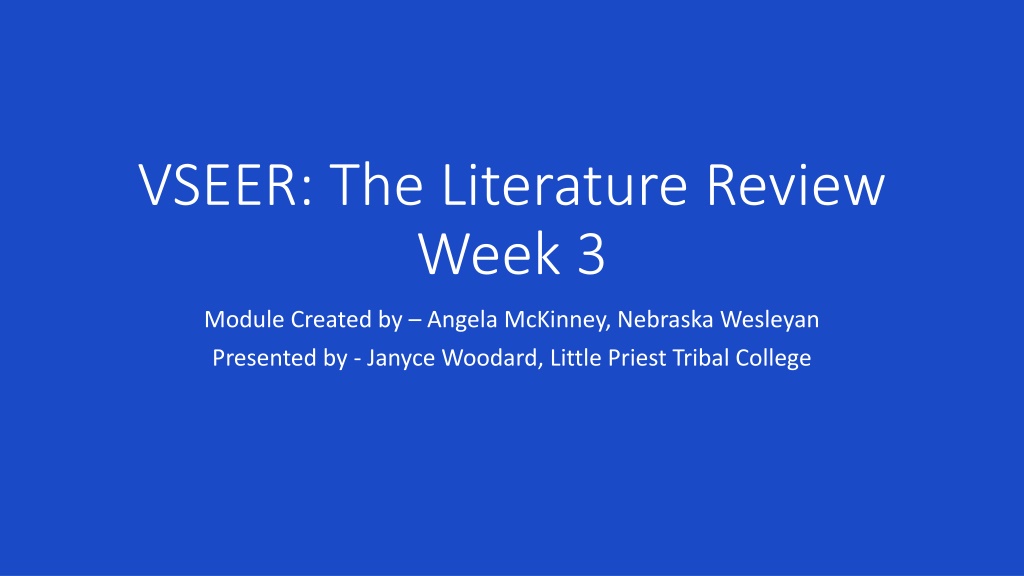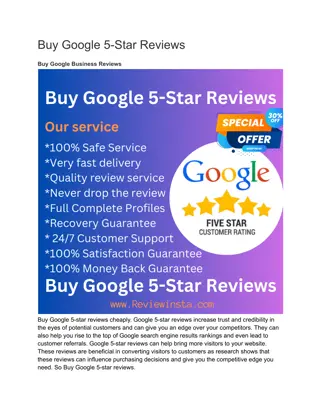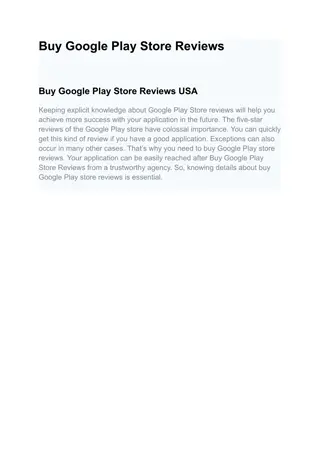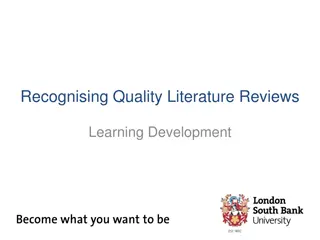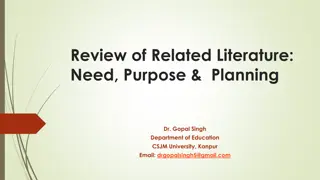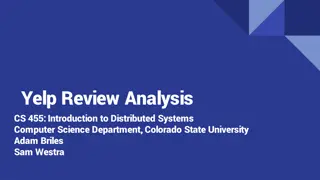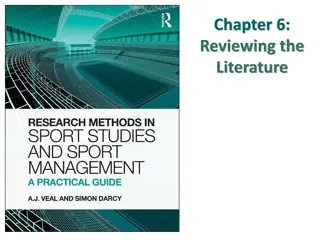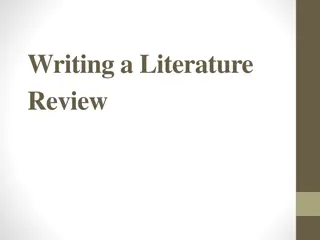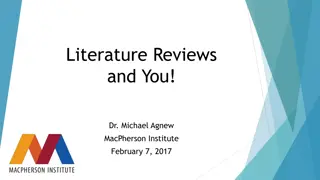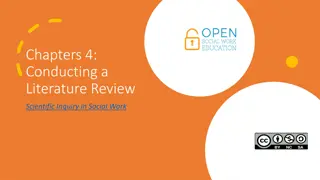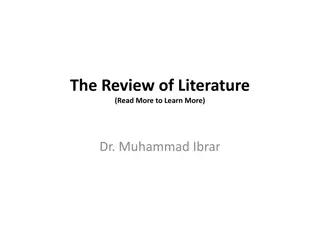Understanding the Importance of Literature Reviews in Research
A literature review is crucial in research to establish context, survey existing literature, explore solutions to research questions, evaluate quality and relevance, identify gaps, and demonstrate scholarly rigor. It provides a critical analysis of previous research, highlighting both strengths and weaknesses to guide future research endeavors effectively.
Download Presentation

Please find below an Image/Link to download the presentation.
The content on the website is provided AS IS for your information and personal use only. It may not be sold, licensed, or shared on other websites without obtaining consent from the author. Download presentation by click this link. If you encounter any issues during the download, it is possible that the publisher has removed the file from their server.
E N D
Presentation Transcript
VSEER: The Literature Review Week 3 Module Created by Angela McKinney, Nebraska Wesleyan Presented by - Janyce Woodard, Little Priest Tribal College
Announcements & Q/A Due now (or before now) Week 1 & 2 Modules Week 3: Reflection 3a The Literature Search Reflection 3b The Peer Review Process Upcoming: Complete Week 3 Assignment (Profile of Myself as a STEM Researcher: Now What? Literature Review) Journal Article Worksheet Attend Virtual Tour of Nahant Marsh with Professor James Wiebler Tuesday 6/22 @ 1pm Complete DiscussionBoard post (Bio and Questions) before session Attend Community Building Thursday 6/24 @ 1pm Complete Intersectionality Bouquet beforesession Complete Week 4 Module VSEER Course Content
Review of Week 3 Module What is the most important take away from Week 3 Module Type it into the chat .. DO NOT PRESS SEND YET Review which take-aways seem to be most prevalent When thinking about what a literature review is, we need to think about what it is for. What is the purpose of a literature review?
Navigating the Scientific Literature Scientific Literature A record of all published research WHY do you want to know what has been done before? WHEN do you want to do a review of the literature? HOW do I search through over 55 million articles to find the one I want? Research databases Title, Abstract, Authors, Article Text Searchable by keywords
What is a literature review for? Establishes the terms and context. How else will you define exactly what you re looking at and where its limits are? Presents a survey of preceding literature on the topic. How else will you know what s been done already? Explores ways that others have solved similar questions/problems. How else will you select an appropriate methodology and approach? Outlines the relationship of these texts to each other. How else will you know what the different perspectives and debates are, and where you are coming from? Evaluates the quality and relevance of the literature. How else will you be able to build on or reject it? Establishes the gaps or inadequacies. How else will you justify your own contribution? Demonstrates your scholarly rigor. How else can I have faith in your conclusions?
Literature Review A critical analysis of existing research in your field; it highlights both the strengths and weaknesses of existing research Allows you to gain a critical understanding of your field Opportunity to think about what has been done in your field; opportunity to think about the similarities, patterns, trends and also differences across the existing research By identifying strengths and weakness, you will be able to think about what has not/needs to be done in your field The gap in the literature is your justification for your research
Small Group Exercise (10 minutes) Discuss the Following: Have you ever had to perform a literature review? If yes, why? What did you think was the most difficult part of the literature review? Where did you find your articles? (specific journal or website) When you get back to the main room, designate one person from your group to list in the chat a few sources for research articles that your group has used.
The Literature Review Process Key Players and Sources First stage of the literature review is to identify the key people in your field and collate all relevant sources about your topic. Ask yourself: What research and theory is there on my topic? What are the key sources (books, articles) on my topic? Who are the main theorists and researchers in this area? How has the topic/problem been investigated over time?
Reading Scientific Articles YOU DON T NEED TO READ EVERYTHING you can t! Parts of a Scientific Article Title and Authors Abstract Introduction Why was the research done Materials and Methods Details on how the study or experiment was conducted Results Presents the data and data analysis Discussion and Conclusions Personal interpretations References
Main Ideas/Debates Once you have the relevant sources you can begin to think about what the key ideas, debates, methodologies etc. are in your field. You can also think about how these ideas have changed over time. Ask yourself: How has the topic or problem been defined? Are there any trends and patterns across the literature? What methodological assumptions and approaches have been used? What are the agreements and disagreements between theorists on my topic?
Thinking About Your Literature Review Map your story (literature review): What is your topic? Who are the key people in your field? What are the key resources? What are the key ideas in your field? What methodologies have been used? What are some of the strengths and weaknesses of existing research? What will your contribution be? How will it be different?
Small Group Exercise (10 minutes) Discuss the Following: Thinking back to the first small group exercise, you discussed and listed source of articles in the chat box Would you consider any of the sources you used more reputable than the others? Why do you think they were more trustworthy? Are there any resources that you wouldn t use again? What are they and why wouldn t you use them?
The Peer Review Process Peer Reviewed Article: articles are sent to 2 or 3 peer scientists who are not directly involved with the research, but a familiar with the field of study or research methods used. Peer reviewers assess the article and provide comments to the editor about the research. Provides some measure of the rigor of the science behind the article and the validity of the findings presented. Journal editors rely on the reviewers' feedback to guide their decisions they may choose to accept a work as is, they may ask the author(s) for revisions, or they may reject the work based on the peer review comments. Importance of Peer Review An obligation of the STEM profession and one factor that helps build the community of science.
Profile of Myself as a STEM Researcher (Wk 3) Reviewing a Journal Article Part 1 Locate an Article Review the information that you have about the professor that you wrote your draft letter to in Week 2 s assignment Find and read one of his/her published papers ISU Library >> Journal Search Same login information for Canvas Part 2 Journal Article Worksheet As you read your journal article, answer the questions on the worksheet
